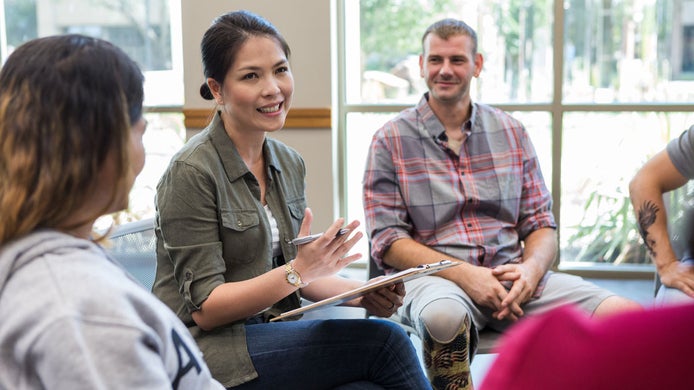Explore our resources for psychology and counseling degrees and learn about career options that fit your future.

Our families and spouses are the people we love most — the ones we turn to for consistent support and understanding. Yet it is also true that personal relationships can be complicated.
When miscommunication occurs with loved ones, it may lead to pain, anger and nights spent silently eating dinner across from one another. But sometimes the discord that seems insurmountable can be overcome by bringing in a fresh perspective, someone to help define the root of the issues and assist in paving a path forward.
As a licensed marriage and family therapist (LMFT), you can help couples and families examine their conflicts and work to repair the bonds they hold so dearly. Through listening, discussing and advising, you could help your clients find ways to make their relationships and families thrive. If you’re eager to learn more, read on to discover how to become a marriage counselor.
How to Become an LMFT in 4 Steps
While everyone’s path looks different, there are some concrete steps you’ll have to go through. Here’s an overview of the basic marriage and family therapist requirements:
1. Obtain a Bachelor's Degree
All marriage and family therapist positions will require a graduate-level education, but first, you’ll need to earn your bachelor’s degree. While studying psychology or communications can be helpful in this career path, most graduate psychology programs will accept students with any undergraduate major. So don’t worry if you’ve invested time and money in a bachelor’s in history or another seemingly unrelated field.
In fact, there are plenty of applicable skills from a variety of majors that will help you become a better therapist. Consider how the following qualities naturally lend themselves to the tasks marriage and family therapists are responsible for:
- Patience: Anyone who has stayed up all night revising a stubborn term paper knows a thing or two about patience. When a client shows little sign of improving and returns to the same problem session after session, this quality will come in handy. Marriage and family therapists will often have to experiment with different approaches to get a message through to a client who won’t budge.
- Boundary setting: A healthy work-life balance is essential, especially for those who work in helping professions. Marriage therapists must create and maintain clear boundaries, which can be difficult at times. But a burnt-out therapist can’t do their job effectively. Making time for self-care is the best thing you can do for yourself (and your clients).
- Collaboration: Most of the time, you will be working by yourself as a therapist. But teamwork skills are still important. In many cases, you will have to collaborate with social workers, insurance companies and psychiatrists to create an effective treatment plan. Your experience on an event planning committee or an intramural team could be put to work in coordinating the best care for your clients.
- Compassion: People can tell when you truly care about them and when you don’t. Being present and invested is critical to building strong relationships with clients. After a long day of appointments, you’ll likely have to work harder at maintaining empathy and compassion. You’ll have an advantage if you’ve already worked to develop this competency as a tutor, coach or teacher.
- Organizational skills: Paperwork is a necessary part of working in mental healthcare. Detailed notes are essential for insurance companies and government programs to accurately assess clients on a case-by-case basis. Writing summaries after each session can also help you remember where to pick up for next time. If your undergraduate degree found you taking complex notes in your classes, then your skills won’t go to waste.
2. Earn a Graduate Degree
Regardless of the bachelor’s degree you hold, you will need a master’s degree to become a licensed marriage and family therapist (LMFT). While doctoral options in psychology are available for those interested in teaching or research, they usually aren’t necessary for counseling roles.
You have several options when it comes to choosing a master’s program. To start, you can choose between a Master of Science (MS) and a Master of Arts (MA). An MA in the field emphasizes advanced statistics and research, while an MS focuses more on behavioral science and counseling. Both degree types require courses in research methods as well as a practicum. In graduate school, you’ll collect and analyze data relevant to the field and complete 150 to 500 practicum hours, in addition to coursework.
It’s also important to understand the different emphases available as part of an advanced therapy degree program. You could specialize in substance abuse, behavior disorders or mental health, for example. With a passion for healing hurting relationships and families, however, becoming an LMFT may be the right path for you.
3. Take the State Licensing Exam
Precise marriage and family therapist requirements will vary, so you’ll need to meet the state-specific guidelines for where you hope to practice. Regardless of the location, you’ll have to take a state-recognized exam.
There are two test options: the National Counselor Examination for Licensure and Certification (NCE), which consists of 200 multiple-choice questions, and the National Clinical Mental Health Counseling Examination (NCMHCE), made up of 10 clinical simulations. Though some states prefer one test over the other, the choice is often yours. But it’s always best to make an informed choice before committing.
4. Decide on the Environment in Which You Want to Work
Once you’ve earned your degree and licensure, you get to decide where to put your newfound skills into practice. The good news is that career opportunities for marriage and family therapists are poised to see a 16 percent increase by 2030 (according to the U.S. Bureau of Labor Statistics), which is much faster than the average growth rate for all occupations.
As an LMFT, you will have the option of opening a private practice, working at a mental health or substance abuse treatment center, or practicing in a hospital. Healthcare providers are increasingly looking for qualified professionals who can help address the underlying issues that exacerbate their patients’ problems.
As with any career, there will be ups and downs to becoming a marriage and family therapist. But in this people-centric field, you’ll have the chance to help others break out of old patterns and make a positive impact for generations to come.
Invest in a Meaningful Career
Relationships are often fraught but also worth repairing. By becoming an LMFT, you will be able to help people find harmony with their closest loved ones.
Now that you have a better understanding of how to become a marriage and family therapist, it’s time to start planning your next steps. Whether that’s completing your bachelor’s degree or starting graduate school, UMass Global has educational options to help qualify you for this rewarding role.
For more information, explore our Bachelor of Arts in Psychology or Master of Arts in Marriage and Family Therapy programs.








